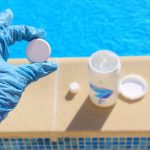Refresh Your Knowledge of Pool Water Maintenance This Spring
With spring around the corner, now is the time to start thinking about the summer season up ahead. Whether you own a residential swimming pool or operate a commercial facility, it’s important to brush up on the pool water maintenance basics before opening up for the season.
However, if you’re busy with responsibilities at work and home, or just aren’t comfortable adjusting chemicals in your pool, we recommend leaving it to a professional. Let’s review a few methods that pool professionals will utilize to maintain your pool water.
Test Time
We aren’t talking about the CPO® test this time. Instead, we’re talking about testing your pool water. A pool professional will test your pool water before and after making any chemical adjustments. This will ensure that your pool water is safe for swimming in. Additionally, they may want to test your pool water after heavy rainfall or storms. When testing, they will be able to review and measure alkalinity, pH, chlorine, and cyanuric acid levels in the water.
Get Pumped
To ensure proper circulation of the water, a professional suggests that your pool pump should be running at all times, if possible. Commercial facilities may be required by code to operate 24/7. As a result, your water should remain clean while chemicals will be evenly distributed throughout the water. A pool water maintenance practice that some people forget to do, in addition to running the pump, is to backwash your filter consistently. This allows contaminants to effectively travel out of the pool.
Shock the System
Your swimming pool professional will suggest shocking your pool once every week, typically at night. They will add a chlorine or non-chlorine shock to the water, which will oxidize bather waste, clear up dull or cloudy water, and attack contaminants. If you test your pool water after a rainstorm and it comes back with unsafe levels, be sure that your pool professional shocks the pool and tests it again before anyone starts swimming.
Control Your Chemicals
Alkalinity
For successful pool water maintenance, your alkalinity levels should be between 80 and 120 ppm (parts per million). Your pool professional will know to add a base if it is too low and an acid if it is too high.
Calcium Hardness
It’s best to keep calcium hardness levels between 200 and 400 ppm. This depends on your surroundings and the type of pool. If you have a fiberglass or vinyl pool, keeping the calcium hardness level on the lower end is okay. If you have a gunite pool, keep it on the higher end of the ideal range.
pH
As a reminder, pH represents how acidic your pool water is. pH levels should stay between 7.2 and 7.8. This is the acceptable range for safe swimming. A pool professional will make sure your pH is at the appropriate level to avoid irritating your swimmers’ skin and eyes, as well as protecting the components of your pool equipment.
Chlorine
When sanitizing your pool, a professional will ensure that your chlorine levels are usually between 1-5 ppm. Commercial pools and spas can be higher based on state code levels. To increase chlorine levels in your pool, chlorine can be added through a feeder or manually.
Are You Ready to Get Started with Pool Water Maintenance?
Suit your swimming pool up for the spring and summer season with Pool Operation Management. We have been providing swimming pool services since 1980. Regardless of whether you need help maintaining your residential pool or even several pools at a commercial facility, our knowledgeable team is here to help. Reach out to Pool Operation Management today with any pool water maintenance questions you have or services you need. Enjoy the warmer weather and refreshing water, we’ll handle the rest.





